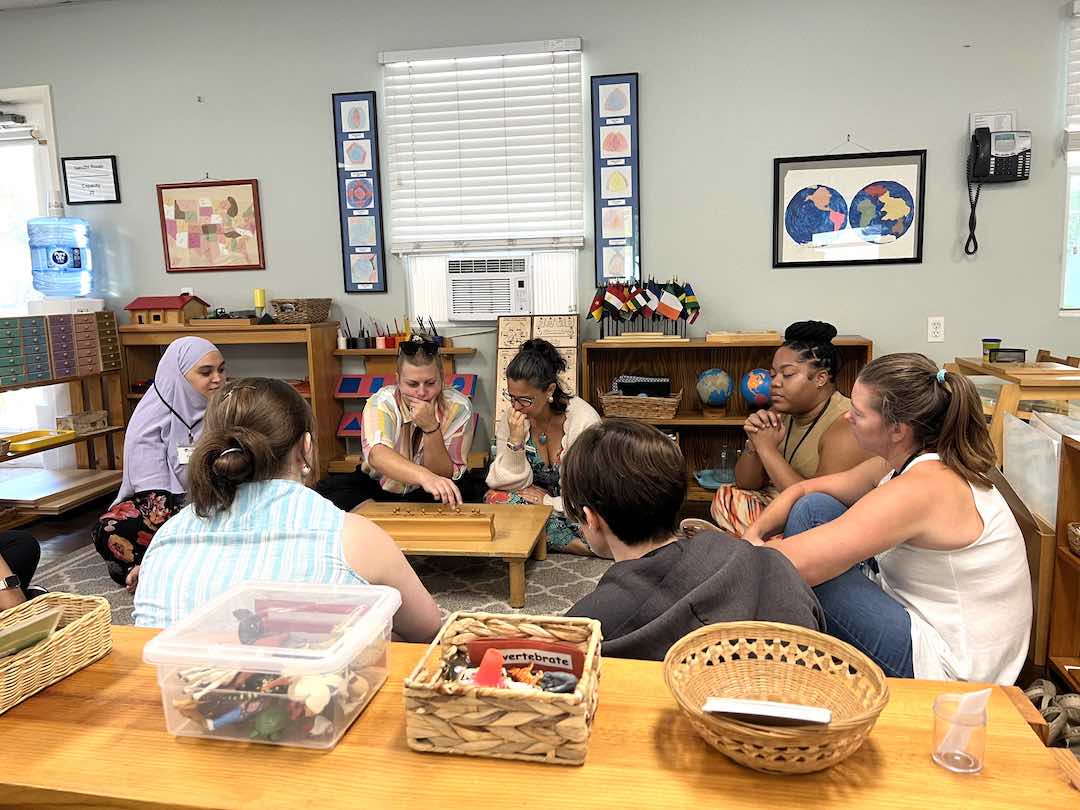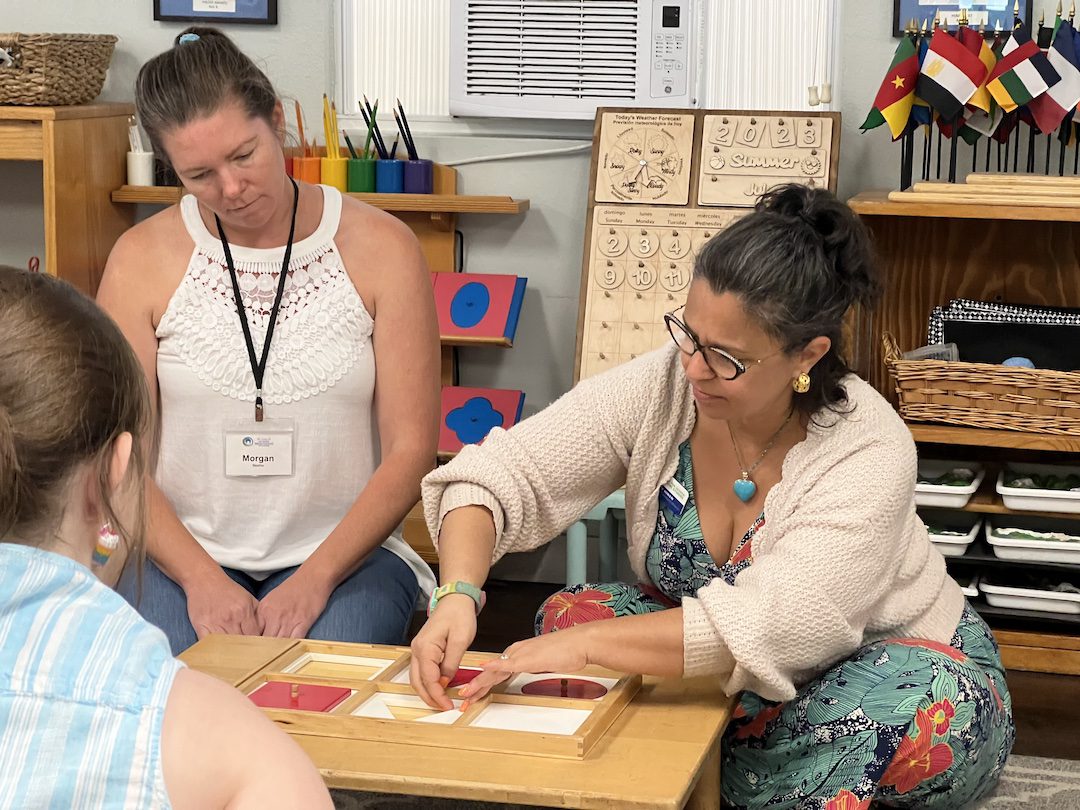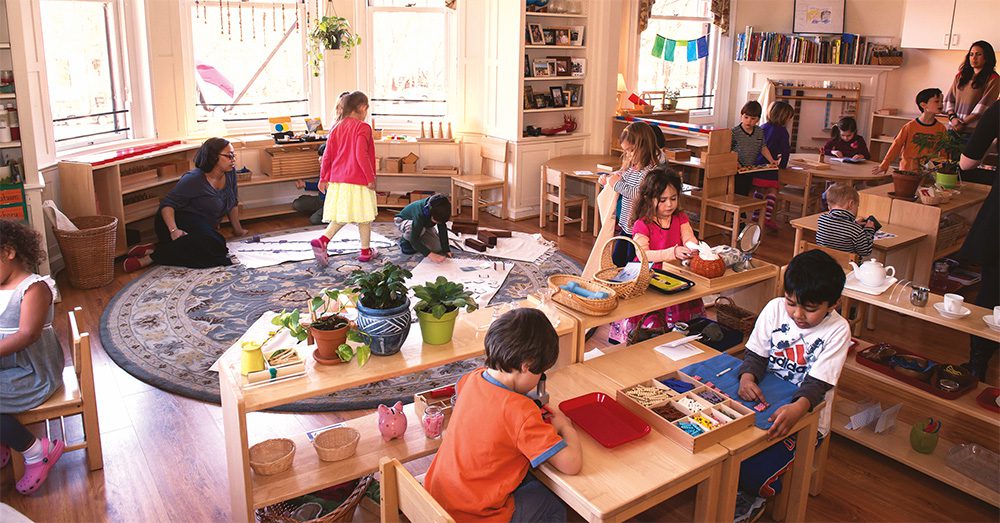Becoming A Montessori Teacher

With the steady growth in the number and enrollment of Montessori schools around the world, certified Montessori teachers are in great demand.
Montessori teachers come from a wide range of backgrounds.
In many parts of the United States, a four-year college degree is a requirement to teach at an independent/nonpublic or public school at all age levels; however, except for areas where even independent/nonpublic school teachers are required to hold a state teaching credential, it is not necessary for prospective teachers to have first graduated with a degree in education. Many Montessori teachers studied another field first.
Many parts of the United States allow preschool teachers to teach without requiring a college degree.
Because these requirements vary from place to place, prospective teachers need to check with either local schools or the State Department of Education to determine the requirements where they would like to teach.
The same rule applies elsewhere around the world. It is essential to confirm national and state/provincial regulations.

Many Montessori teachers began first as parents with children enrolled in a Montessori school. Often the very factors that drew enthusiastic parents to a Montessori school in the first place offer the possibility of a professional life beyond their roles as parents. It is common for enthusiastic parents to approach their children’s school or are themselves approached about the possibility of taking a course in Montessori teacher education.
Montessori teacher education programs are available from hundreds of colleges and independent institutes across America and Canada. Courses are available in many other countries as well. Usually, Montessori teacher education programs involve a year or more of study.
In the United States, many courses are organized into summer institutes, which can involve one, two, or more summers of intensive study followed by a supervised year-long practicum/student teaching experience.
Other courses run during the school year.
Each model has its loyal advocates, and the selection of one over the other is a matter of personal preference.
Montessori teacher education programs are typically offered at the infant-toddler (birth to age 2), early childhood (ages 3-6), lower elementary (ages 6-9), upper elementary (ages 9-12), and secondary levels (ages 12-15 and ages 15-18).
Most courses in the United States require a college degree, although students who have yet to complete their undergraduate diploma may be able to take a Montessori teacher education course and receive a provisional Montessori teaching certificate.
Tuition will vary from one program to another.
It is common for Montessori schools to sponsor someone who they know—an assistant, substitute, or a parent of one of their students—through Montessori teacher education. In most cases, the school covers the cost of the program upfront and forgives the expense in return for a commitment to teach at the school for a number of years.

Unfortunately, the quality of Montessori teacher education programs can vary.
One basic consideration is the credibility of the diploma received upon completion. Since 1995, the United States Department of Education has recognized the Montessori Accreditation Council for Teacher Education (MACTE), which is generally recognized as the essential sign of a program’s credibility. Since then, MACTE accreditation has become widely recognized around the world. Visit their website for a list of accredited programs. (www.macte.org)
Several Montessori organizations affiliate Montessori teacher education programs in the United States and many more in other countries. Most, but not all, of their programs, are also accredited by the MACTE commission.
They include the American Montessori Society (AMS), the Association Montessori Internationale (AMI), International Montessori Council (IMC), Montessori Educational Programs International (MEPI), and the Pan American Montessori Society (PAMS). A number of smaller Montessori associations and a number of independent programs also offer accredited Montessori teacher education programs also are accredited by MACTE.
Online Montessori Training: We are often asked if one can become a Montessori teacher online. We recommend against this, even though several centers offer programs that are entirely online. Teacher education involves supervised student teaching and an in-person component even if a substantial portion of the coursework is delivered online. Online-only programs are not accredited.
Several organizations around the world offer blended residential and distance learning programs or correspondence courses, which allow students to complete some of their Montessori teacher education studies online. The IMC-affiliated Center for Guided Montessori Studies (www.guidedstudies.com) is a good example of a Montessori teacher education program that is fully accredited by MACTE and blends residential and distance learning into very high-quality Montessori teacher education.
Most Montessori schools are private, but there are a growing number of public and charter Montessori schools. While Montessori teachers in private settings might earn less compared to their public school counterparts, many feel the trade-offs in job satisfaction and reduced bureaucracy outweigh the financial aspects. Salaries often correlate with qualifications, experience, and responsibilities. Given the high demand, Montessori-certified teachers often find multiple schools vying for their expertise. Salaries are often calculated on a scale based on degrees, experience, and duties.
Montessori teachers are generally in short supply, and in many situations, Montessori-certified teachers will find several schools competing for their services.
For a list of the accredited teacher education programs in the US, Canada, and many other countries as well, go to either the individual organization websites or go to the MACTE website at www.macte.org.
If you are searching for a Montessori teacher education program, you might also wish to contact the Montessori schools in your area. Through them, you will obtain information about what is available in your region and what certification they require, especially if you are hopeful of obtaining employment with them in the future. Many good teacher education programs are available in the United States and abroad. In the years to come, there will undoubtedly be even more as the demand for Montessori teachers increases.

Montessori Accreditation Council for Teacher Education (MACTE)
MACTE OFFICE
420 Park Street, Charlottesville, VA 22902
Phone: (434) 202-7793 Email: info@macte.org
